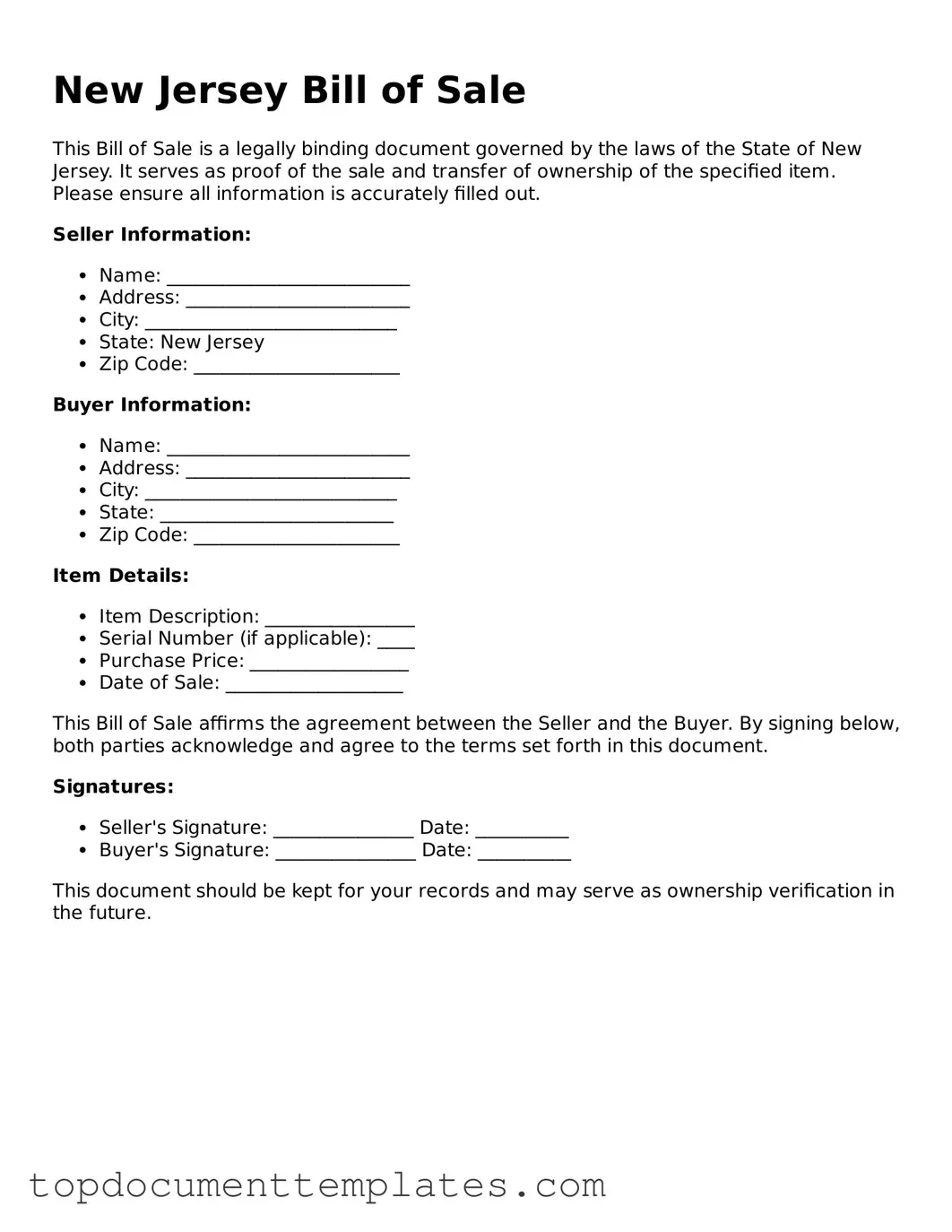Valid Bill of Sale Form for New Jersey State
When engaging in a transaction involving the sale or transfer of personal property in New Jersey, understanding the Bill of Sale form is essential. This document serves as a crucial record of the exchange, providing both the buyer and seller with legal protection and clarity regarding the terms of the sale. A well-crafted Bill of Sale includes key elements such as the names and addresses of both parties, a detailed description of the item being sold, and the sale price. Additionally, it may contain information about the condition of the item, any warranties provided, and the date of the transaction. In New Jersey, while a Bill of Sale is not always legally required for every type of sale, having one in place can prevent misunderstandings and disputes down the line. It acts as a receipt and can be particularly important for high-value items or vehicles, where proof of ownership and transaction details are vital. By utilizing this form, individuals can ensure a smoother process, fostering trust and transparency in their dealings.
Similar forms
- Purchase Agreement: This document outlines the terms of sale between a buyer and a seller. Like a Bill of Sale, it confirms the transfer of ownership of goods or property.
- Lease Agreement: A lease agreement allows a person to use property for a specified time in exchange for payment. Similar to a Bill of Sale, it involves the transfer of rights, though it does not transfer ownership.
- Title Transfer Document: This document is used to transfer ownership of a vehicle or property. It is similar to a Bill of Sale in that it serves as proof of ownership change.
- Gift Deed: A gift deed transfers ownership of property without payment. Like a Bill of Sale, it requires the consent of both parties and serves as legal proof of the transaction.
- Service Agreement: This document outlines the terms under which services will be provided. It shares similarities with a Bill of Sale by detailing the exchange of value between parties.
- Sales Receipt: A sales receipt provides proof of purchase for goods. It is similar to a Bill of Sale as it documents the transaction and can serve as evidence of ownership.
- Warranty Deed: A warranty deed guarantees that the seller has clear title to the property being sold. It is akin to a Bill of Sale in that it confirms the transfer of ownership.
- Promissory Note: This document is a promise to pay a specific amount of money at a future date. It is similar to a Bill of Sale in that it involves a financial transaction between parties.
- Contract for Deed: This is an agreement where the buyer pays for property over time while the seller retains the title until paid in full. It shares characteristics with a Bill of Sale by detailing the terms of ownership transfer.
- Assignment Agreement: An assignment agreement transfers rights or interests from one party to another. It is similar to a Bill of Sale in that it formalizes the transfer of ownership or rights.
Guidelines on Writing New Jersey Bill of Sale
After obtaining the New Jersey Bill of Sale form, you'll need to fill it out accurately to ensure a smooth transaction. Follow these steps to complete the form correctly.
- Enter the date: Write the date of the sale at the top of the form.
- Provide seller information: Fill in the seller's full name and address. Make sure this information is current and accurate.
- Provide buyer information: Enter the buyer's full name and address. Double-check for any typos.
- Describe the item: Clearly describe the item being sold, including make, model, year, and any identifying numbers, such as a VIN for vehicles.
- State the purchase price: Indicate the total amount the buyer is paying for the item.
- Sign the form: Both the seller and buyer must sign and date the form to validate the sale.
Once you have completed the form, keep a copy for your records. The buyer should also retain a copy for their files. This documentation is important for future reference and potential legal needs.
File Information
| Fact Name | Description |
|---|---|
| Purpose | The New Jersey Bill of Sale form serves as a legal document to transfer ownership of personal property from one individual to another. |
| Governing Law | This form is governed by New Jersey state laws, particularly under the New Jersey Statutes Annotated (N.J.S.A.) 46:30-1. |
| Types of Property | The Bill of Sale can be used for various types of personal property, including vehicles, boats, and equipment. |
| Notarization | While notarization is not always required, having the document notarized can provide additional legal protection. |
| Buyer and Seller Information | The form must include the names and addresses of both the buyer and the seller to ensure clarity in the transaction. |
| Consideration | The Bill of Sale should specify the consideration, or payment, exchanged for the property, which can be monetary or otherwise. |
| Record Keeping | Both parties should retain a copy of the Bill of Sale for their records, as it serves as proof of the transaction. |
Other Popular Bill of Sale State Forms
Michigan Bill of Sale Car - Facilitates easy record-keeping for both the buyer and seller.
Az Dmv Bill of Sale - Typically required for the sale of significant items like cars or real estate.
Bill Sale Car - This document often includes a warranty, which may assure the buyer of the item's condition.
What Is the Penalty for Not Transferring Title Within 30 Days in Iowa - In some states, a Bill of Sale is mandatory for certain transactions.
